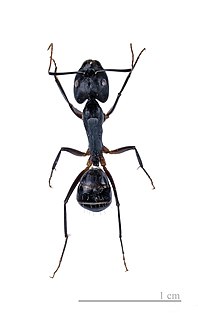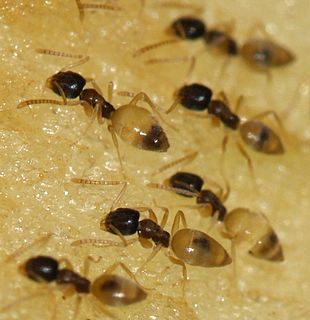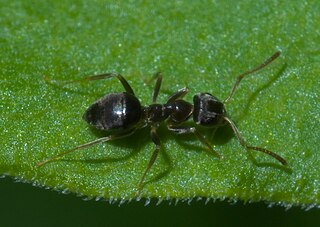
The yellow crazy ant(Anoplolepis gracilipes) is a species of ant, originally from Southeast Asia, that has been accidentally introduced to numerous places in the world's tropics.

The Formicinae are a subfamily within the Formicidae containing ants of moderate evolutionary development.

Tapinoma melanocephalum is a species of ant that goes by the common name ghost ant. They are recognised by their dark head and pale or translucent legs and gaster (abdomen). This colouring makes this tiny ant seem even smaller.

Paratrechina is one of seven ant genera in the Prenolepis genus-group from the subfamily Formicinae. Six species are included in Paratrechina; one of which, the longhorn crazy ant, is a widespread, pantropical pest.

The chocolate-backed kingfisher is a species of kingfisher in the subfamily Halcyoninae which occurs in western Sub-Saharan Africa.

Thestor brachycerus, the Knysna skolly, is a species of butterfly in the family Lycaenidae. It is endemic to South Africa.
Thestor yildizae, the peninsula skolly, is a species of butterfly in the family Lycaenidae. It is endemic to South Africa, where it is only found on the high slopes of the Cape Peninsula Mountains in the Western Cape.

Anoplolepis nuptialis is a species of ant in the genus Anoplolepis. It is native to South Africa.

Anoplolepis, also known as the "pugnacious ants", is a genus of ants in the subfamily Formicinae and tribe Lasiini. The genus is mainly found in the Afrotropics, with a few native species known from the Malagasy and Oriental regions.

Christmas Island National Park is a national park occupying most of Christmas Island, an Australian territory in the Indian Ocean southwest of Indonesia. The park is home to many species of animal and plant life, including the eponymous red crab, whose annual migration sees around 100 million crabs move to the sea to spawn. Christmas Island is the only nesting place for the endangered Abbott's booby and critically endangered Christmas Island frigatebird, and the wide range of other endemic species makes the island of significant interest to the scientific community.

Anoplolepis custodiens, commonly known as the common pugnacious ant, is a species of ant in the genus Anoplolepis, native to central and southern Africa. Individual ants may come in a range of colors and sizes. Found in dry and cultivated areas, it is an important source of prey for some pangolins and aardvarks. Although generally aggressive, ants from other colonies of Anoplolepis custodiens are not attacked.
Thestor pictus, the Langeberg skolly, is a butterfly of the family Lycaenidae. It is found in South Africa, where it is found in fynbos-covered mountain slopes above Garcia's Pass on the Langeberg.
Thestor rileyi, the Riley's skolly, is a butterfly of the family Lycaenidae. It is found in South Africa, where it is known from the Western Cape, from the Helderberg and Paarl mountains to the Kouebokkeveldberg, Piketberg and Paardeberg mountain ranges.

Thestor basutus, the Basuto skolly or Basuto magpie, is a butterfly of the family Lycaenidae. It is found in South Africa, Botswana and Zimbabwe.
Trimenia malagrida is a butterfly of the family Lycaenidae. It is found in South Africa, where it is found from Beaufort West to the Roggeveld escarpment in the Western Cape.

Leucospermum conocarpodendron, is the largest species of the genus reaching almost tree-like proportions of 5–6 m (16–20 ft) high, with a firm trunk that is covered in a thick layer of cork that protects it from most fires, with greyish or green narrow or broad inverted egg-shaped leaves with three to ten teeth near the tip, and large yellow flowerheads, with firm, bent, yellow styles that stick far beyond the rest of the flower and give the impression of a pincushion. It is commonly known as the tree pincushion in English or goudsboom in Afrikaans. They naturally occur near Cape Town, South Africa. Two subspecies are distinguished. L. conocarpodendron subsp. conocarpodendron, that has greyish leaves because they have a covering of felty hairs. L. conocarpodendron subsp. viridum, has green leaves that lack felty hairs. Flowers can be found between August and December.

Trichomyrmex destructor is a species of ant in the subfamily Myrmicinae. Its common names include destructive trailing ant or Singapore ant. It is a pest species in urban areas, known for causing costly damage to structures, vehicles, and electronic devices with its chewing activity. In 2015, the species was moved from the genus Monomorium to the revised genus Trichomyrmex.

Camponotus cinctellus, commonly known as the shiny sugar ant, is a species of sugar ant with an extensive range in the eastern Afrotropics.
Pseudotheraptus wayi, the coconut bug, is a species of leaf-footed bug in the family Coreidae. It is a pest of coconut in East Africa.

Lasiini is a tribe of ants in the family Formicidae. There are about 10 genera and more than 450 described species in Lasiini.














